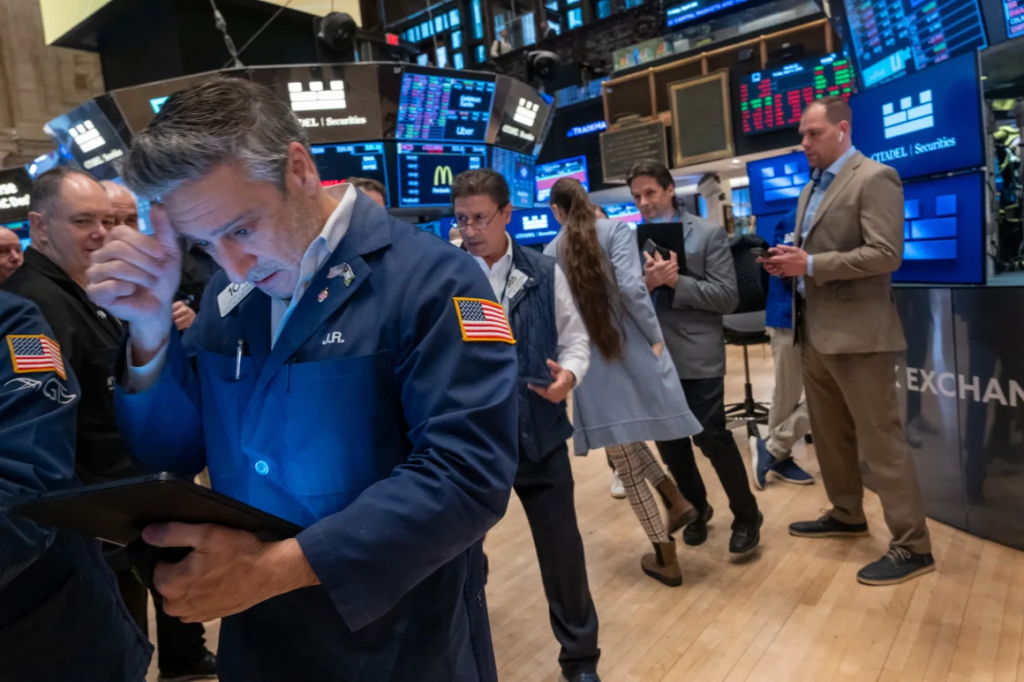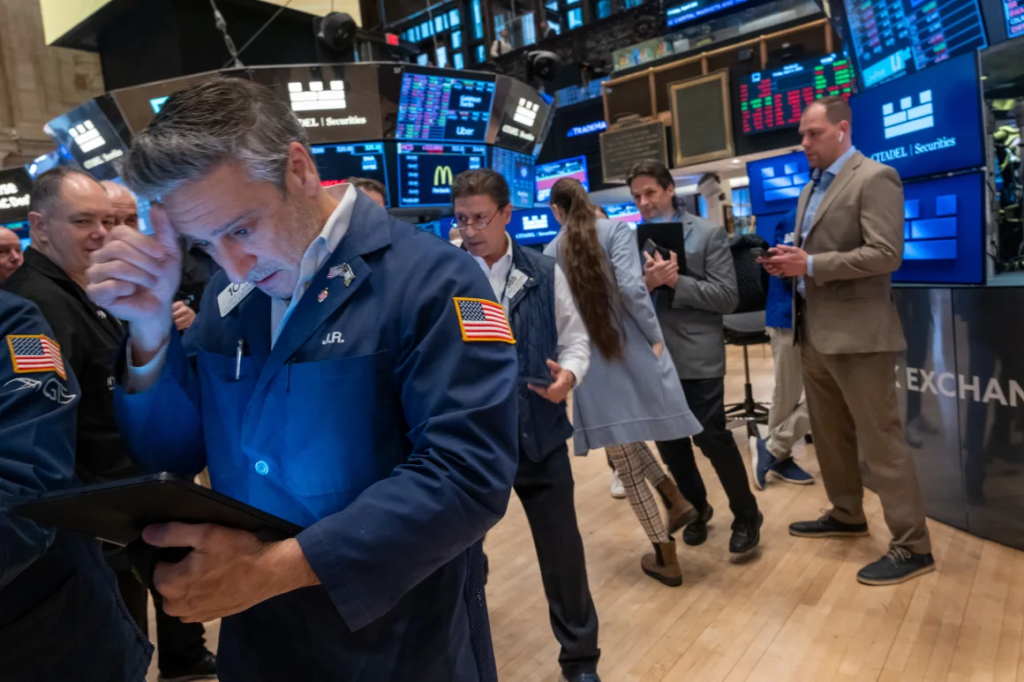The central question facing global markets this week, as stock sell-offs deepen, is how far President Donald Trump is willing to go to test his aggressive tariff strategies.

Speaking Sunday evening, Trump said he was “open to talking” with world leaders about new trade deals, attempting to project confidence amid mounting market chaos sparked by his trade policies. After spending the weekend golfing at his Florida resorts, Trump claimed he had spoken to “many countries,” insisting that despite global backlash to his “Liberation Day” trade actions, “They’re being very nice.”
However, as Trump returned to Washington aboard Air Force One, stocks in Tokyo dropped sharply at the open, dragging Asian markets down and signaling further turmoil on Wall Street, with U.S. futures pointing to continued losses on Monday.
“I can’t predict the markets,” Trump said, while trying to downplay the significant drops affecting millions of Americans’ retirement accounts. “But I can tell you, our country has gotten a lot stronger, and eventually it’ll be a country like no other.”
He added: “I don’t want anything to go down. But sometimes you have to take medicine to fix something.”
Markets slide as uncertainty grows over tariff policy
After a brutal week of market losses and with trading paused over the weekend, the White House had a brief opportunity to regroup. But no clear direction emerged from the administration, and the stakes continue to grow.
Senior officials delivered mixed messages Sunday, leaving it unclear whether Trump’s tariff blitz is a short-term bargaining chip or a long-term attempt to reshape the global economic order — a project that could take years to realize.
Tensions within Trump’s own party also grew, with some Republicans expressing concern over the widening trade conflict. Meanwhile, thousands of demonstrators nationwide took part in anti-Trump protests — the largest public outcry of his second term so far.
Despite rising anxiety about a potential recession, Trump and his inner circle showed little sign of concern. He posted a video of himself teeing off in Florida, and the White House released a strange statement celebrating his win in a golf club championship.
The imagery reinforced the contrast between Trump’s elite social circle and the everyday Americans worried about rising costs and dwindling retirement savings. While Trump claims his tax policies will boost prosperity, many view his economic gamble as risky — especially after a second-term win that stemmed partly from dissatisfaction with how the Biden administration handled inflation.
Trump’s tariffs raise recession fears
Trump argues that decades of global trade have harmed American workers and that sweeping tariffs on 185 nations will restore lost jobs and revive U.S. manufacturing. But many economists warn that his approach threatens to destabilize the global economy and could plunge the U.S. into recession.
While globalization has indeed created winners and losers, the U.S. — as the world’s wealthiest and most powerful nation — has also reaped substantial benefits. Trump’s plan to dismantle the current trading system could backfire dramatically.
The shock of Trump’s unexpectedly broad tariffs contributed to last week’s global market slide and renewed concerns about widespread job losses and economic fallout.
Mixed messaging deepens confusion
It fell to Trump’s Cabinet on Sunday to explain the administration’s economic strategy. Agriculture Secretary Brooke Rollins, speaking on CNN’s State of the Union, called the tariffs a “national security issue” aimed at reshoring millions of jobs and rebuilding industrial strength.

Yet she also implied the tariffs were a negotiation tool, noting that more than 50 countries were urgently reaching out to the White House. “This is the ultimate dealmaker leading our government,” she said.
Trump echoed this message aboard Air Force One, signaling openness to trade talks with China and the EU to address U.S. trade deficits — remarks some analysts saw as an attempt to calm market fears ahead of Monday’s open.
Bilateral deals might yield modest gains, but experts doubt they could restore the industrial economy of a century ago — and warn that any benefits might not outweigh the current disruption.
Commerce Secretary Howard Lutnick took a harder line, confirming that tariffs would go into effect as planned. Speaking on CBS’ Face the Nation, he said, “There is no postponing,” and added, “The president needs to reset global trade.”
Lutnick warned other countries not to retaliate: “If you fight back against the greatest customer in the world, you’re going to lose. We are the sumo wrestler of this world.”
The administration rarely addresses the risk of facing multiple trade retaliations at once. China, for example, now faces a 54% cumulative tariff on exports to the U.S., while it has imposed a 34% tariff on U.S. goods, worsening conditions for American firms abroad and increasing prices for U.S. consumers.
Economic fears grow — but officials downplay risk
Last week’s steep losses — with both the Dow and S&P 500 dropping over 5% on Friday alone — rattled millions of Americans relying on their 401(k)s for retirement.
Yet Treasury Secretary Scott Bessent dismissed recession fears and played down the impact, calling the volatility a natural part of a “choppy adjustment process.” Speaking on NBC’s Meet the Press, he said most Americans understand that the market is a long-term investment and shouldn’t worry about short-term fluctuations.
“The stock market is considered a good investment over time,” Bessent said. “If you look day-to-day, week-to-week, it’s very risky. But over the long term, it’s solid.”